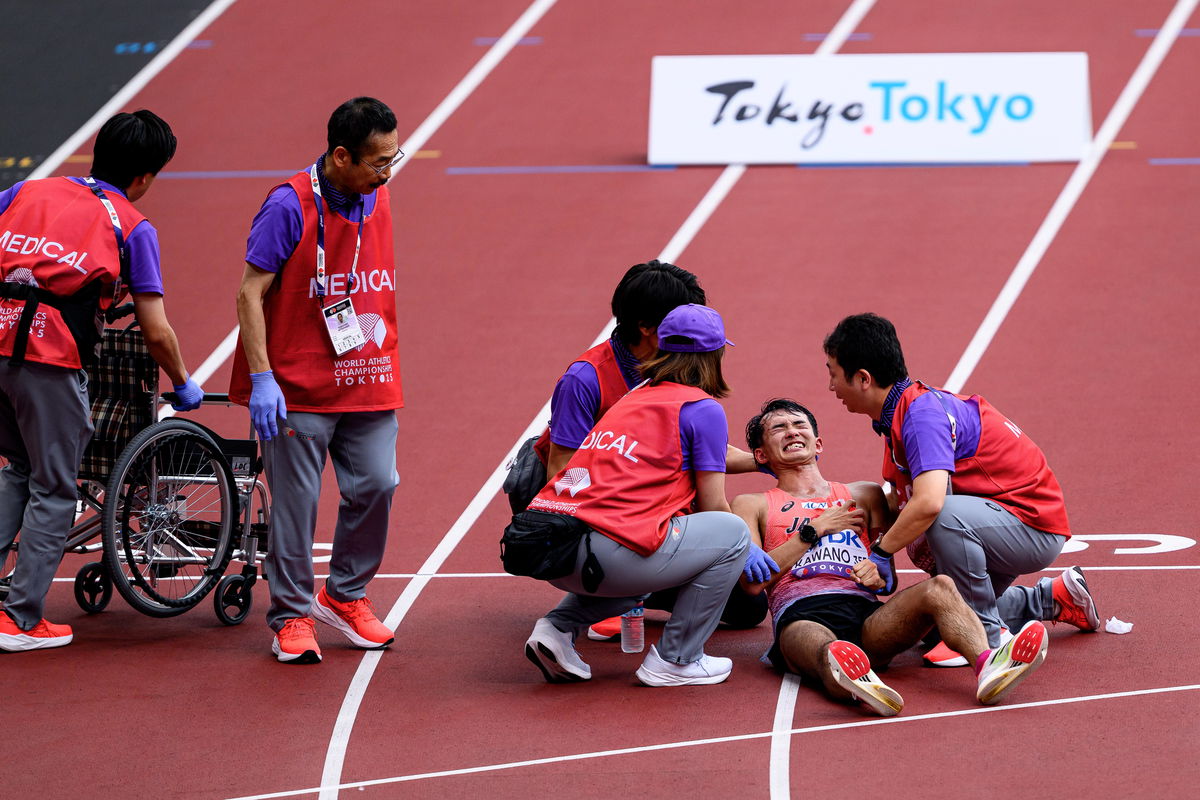
Imago
250913 Masatora Kawano of Japan receives medical attention after competing in men s 35 kilometers race walk during day 1 of the 2025 World Athletics Championships on September 13, 2025 in Tokyo. Photo: Joel Marklund / BILDBYRAN / kod JM / JM0729 bbeng friidrott athletics friidrett 2025 world athletics championships world athletics championships tokyo 25 friidrotts-vm friidretts-vm vm *** 250913 Masatora Kawano of Japan receives medical attention after competing in men s 35 kilometers race walk during day 1 of the 2025 World Athletics Championships on September 13, 2025 in Tokyo Photo Joel Marklund BILDBYRAN kod JM JM0729 bbeng friidrott athletics friidrett 2025 world athletics championships world athletics championships tokyo 25 friidrotts vm friidretts vm vm PUBLICATIONxNOTxINxSWExNORxFINxDEN Copyright: JOELxMARKLUND BB250913JM032

Imago
250913 Masatora Kawano of Japan receives medical attention after competing in men s 35 kilometers race walk during day 1 of the 2025 World Athletics Championships on September 13, 2025 in Tokyo. Photo: Joel Marklund / BILDBYRAN / kod JM / JM0729 bbeng friidrott athletics friidrett 2025 world athletics championships world athletics championships tokyo 25 friidrotts-vm friidretts-vm vm *** 250913 Masatora Kawano of Japan receives medical attention after competing in men s 35 kilometers race walk during day 1 of the 2025 World Athletics Championships on September 13, 2025 in Tokyo Photo Joel Marklund BILDBYRAN kod JM JM0729 bbeng friidrott athletics friidrett 2025 world athletics championships world athletics championships tokyo 25 friidrotts vm friidretts vm vm PUBLICATIONxNOTxINxSWExNORxFINxDEN Copyright: JOELxMARKLUND BB250913JM032
‘The man who started from the bottom.’ That’s how the 26-year-old Masatora Kawano’s journey to the World Althetics Championships began. The very first time Kawano participated in walk racing as a high schooler, his last finish made him believe he wasn’t cut out for the sport. But his determination was much bigger than the weight of that loss. And as he stepped into Tokyo’s iteration of the World Althetics Championships this year, he framed his outlook: “I earned the right to compete at the World Championships, but I don’t see that as the goal. It’s simply the starting line.” However, before he could succeed in his mission, he was met with an unexpected physical ailment.
Watch What’s Trending Now!
The opening stages of the 35-kilometer contest suggested he remained on course. By the 27-kilometer mark, Kawano was still engaged in the medal chase, closely following Brian Daniel Hurtado of Ecuador. Yet the signs of distress became impossible to miss. Kawano continued with staggered steps, clenching his chest, until he couldn’t. Kawano crossed in 18th place with a time of 2:37:15, far from the standards that had defined his career.
Moments later, he collapsed onto his back, his body convulsing in visible pain. Witnesses saw him clutching his chest while suffering cramps in his legs and torso. Medical personnel sprinted into action, bringing a wheelchair and emergency assistance directly onto the track. He was carried away as his teammate Hayato Katsuki, who had secured bronze, approached with clear concern.
ADVERTISEMENT
The former world record holder, once celebrated for efficiency and endurance, was forced to leave the stadium in a wheelchair before the home crowd. So far, no update on his condition is available. The Tokyo World Championships marked the first time in 34 years that Japan had hosted the event, and Kawano’s story became one of its earliest defining images. For Kawano, who once stood as the world’s fastest over 35 kilometers, the opening day in Tokyo will be remembered not for triumph, but for an agonizing conclusion to a race that began with promise. But that doesn’t eclipse the work his resume already boasts.
競歩日本代表の川野選手
最後まで本当に良く頑張った! pic.twitter.com/5zjxnSUmPY— MMラック@青梅・北欧猫との生活 (@0907luck) September 13, 2025
The 26-year-old star entered the Tokyo World Championships as Japan’s strongest medal prospect in the 35-kilometer race walk. Already, he etched his name as a national record holder in the 50-kilometer walk with 3:36:45 in 2019, and former world record holder in the 35-kilometer walk with 2:21:47 in Takahata in 2024. Moreover, he is a silver medalist at the 2022 World Athletics Championships in Eugene and a bronze medalist in Budapest in 2023, and was looking for a global stage to add more titles to his name.
ADVERTISEMENT
The Tokyo World Championships marked the first time in 34 years that Japan had hosted the event, and Kawano’s story became one of its earliest defining images. For Kawano, who once stood as the world’s fastest over 35 kilometers, the opening day in Tokyo will be remembered not for triumph, but for an agonizing conclusion to a race that began with promise.
However, just a year ago, the narrative was different. A year before the Tokyo World Championships, Masatora Kawano’s world-record victory in Takahata established him as Japan’s leading medal prospect in the 35km race walk.
ADVERTISEMENT
Top Stories
Patrick Mahomes’ Dad Faces 10-Year Prison Sentence After Chiefs QB’s Father Reportedly Violated Probation Terms

Prayers Pour In From Jordan Love & Co. as Cowboys Star Mourns Tragic Personal Loss

Justin Jefferson Makes Final Decision on Joining Buffalo Bills After Further Damaging J.J. McCarthy Relationship

Matthew Stafford Makes Final Decision on Retirement After Narrowly Beating Drake Maye For NFL MVP

Multiple PGA Tour Pros Stopped from Playing as WM Phoenix Open Round Is Canceled Over Recurring Problem

PGA Tour Split Into Two as Scottie Scheffler Confirms Stance on Patrick Reed’s Return

How Masatora Kawano became Japan’s medal hope
Masatora Kawano’s decisive march through Takahata in 2024 marked a turning point for both his career and Japan’s expectations ahead of the Tokyo World Championships. At the All Japan Race Walking competition, Kawano moved with a group through the early stages, crossing 10km in 40:25, already tracking a pace that placed him firmly inside the record threshold of 2:22:00. At 15km, the contest narrowed to just three, but by 25km his rivals began to fade, with Kazuki Takahashi stepping off the course entirely. As the kilometres diminished, Kawano exerted growing command.
By 30 km, he held a lead of 34 seconds, which widened considerably until he crossed the line nearly three minutes ahead of Satoshi Maruo, who had once been his closest challenger. He delivered a performance of remarkable precision, completing the 35km in 2:21:47. This time, ratified as a world record, not only satisfied the strict criteria established by World Athletics but also underscored his emergence as one of the nation’s foremost medal prospects.
ADVERTISEMENT
Kawano’s record did not emerge in isolation; it was the culmination of steady progression and repeated championship performances. Already a two-time world medalist, he used the Takahata stage to establish himself as a figure around whom home supporters could rally. The performance served as a demonstration that the 35km, newly formalised as a global discipline, would belong to those with both durability and discipline. For Japan, his triumph was an early indication that the Tokyo Worlds would feature one of their own as a genuine contender. But unfortunately, things took a grim turn. Amid such a situation, we are praying for Kawano’s speediest recovery.
ADVERTISEMENT
ADVERTISEMENT
ADVERTISEMENT